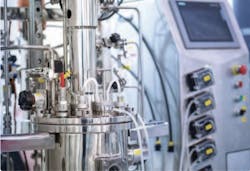Harnessing the power of our body’s own immune system to treat serious diseases has been a major scientific goal over the last few decades. One powerful application of this approach is autologous CAR-T therapy, where the patient’s own immune cells are collected, genetically modified and infused back into the patient.
Autologous CAR-T therapies are now an established class within medicine, delivering remarkable results in hematological cancers. But ultimately, not all patients and disease types are a fit for this approach. The creation of autologous T-cell therapies comes with limitations. The process is rigorous, but manufacturing challenges can occur, and patients sometimes can’t wait.
To reach more patients, companies are now advancing allogeneic — or off-the-shelf T-cell therapy platforms — which use immune cells from healthy donors with the goal to make manufacturing more feasible and scalable. Studies are being conducted in different tumor types and non-cancer indications, including autoimmune diseases.
The technology
Over the last decade, the use of genetically enhanced autologous T-cells has emerged as a powerful immunotherapeutic approach for cancers and other diseases. Harnessing the power of a patient’s immune system to target and eliminate disease-specific cells is a meaningful step in the treatment of diseases that previously relied mostly on chemotherapies.
The premise of chimeric antigen receptor (CAR) T-cell therapy seems almost futuristic: A patient’s own T-cells are isolated, reprogrammed to target cancer cells, multiplied and reintroduced into the patient’s body. The reality, however, is physically and logistically complex. To generate CAR-T cells, patients first undergo leukapheresis, where blood is removed, processed to isolate specific components, and returned to the patient. In this case, the mononuclear cell (MNC) layer containing lymphocytes is removed for processing to further isolate T lymphocytes.
Following isolation, T-cells must be activated using artificial antigen-presenting cells (APCs), monoclonal antibodies (mAbs), or mAb-coated paramagnetic beads. The activated cells can then be genetically modified using viral transduction or RNA transfection to express the desired CAR — ideally, one that binds an antigen expressed by malignant cells but not healthy tissue. After modification, cell cultures are monitored and tightly controlled within GMP requirements to obtain significant quantities of CAR-T cells for clinical treatment. Once manufacturing is complete, CAR-T cells are shipped back and re-infused into the patient. While the infusion process is similar in length to a blood transfusion, patients are often admitted and require close monitoring for days to weeks.
Diversifying the pipeline
The first wave of CAR-T therapies has largely focused on hematologic malignancies. Programs to treat solid tumors are underway but the trials have encountered challenges with the low infiltration level of immune cells navigating into a solid cancerous mass and the difficulty of identifying antigens that are present on tumor cells but largely absent in normal cells. Additionally, the micro-environment that surrounds tumors is much more hostile to T-cells than that of the lymph nodes, making T-cell survival an additional challenge.
Ultimately, the value of T-cell therapies is not just limited to cancer. They may also provide a promising path forward in treating autoimmune disease, either by targeting and destroying autoreactive cells or protecting cells under autoimmune attack.
Potential capabilities with allogeneic T-cell therapies
Investigational allogeneic T-cell therapies take an alternative approach, and may hold the promise of personalized, off-the-shelf treatments manufactured at scale and quickly delivered to the patient, having the potential to overcome typical barriers that have limited the success of current autologous T-cell technologies.
Autologous CAR-T drugs face multiple challenges to manufacture at scale. Even a state-of-the-art autologous T-cell process can require 20–27 days after leukapheresis. GMP requires final CAR-T products to meet pre-defined, consistent specifications, but source materials from individual patients can vary based on disease status and prior treatments. Patient-specific material also must be tracked and isolated throughout the manufacturing process, and any delays can be detrimental to patient outcomes. Taken together, this individualized production process restricts many aspects of manufacturing and limits the number of patients that can be treated.
Allogeneic therapies currently in development could be produced in larger bioreactors with the potential for greater consistency and more streamlined GMP-compliant standards. Reducing the number of touchpoints throughout the manufacturing process may create less room for error. Once the lot is released, it can be cryopreserved and stored, awaiting patient need. Companies can create an inventory of different manufactured lots that provide a breadth of human leukocyte antigen (HLA) coverage to ensure immune compatibility for nearly all patients. This could also extend the option of T-cell therapy to severely lympho-depleted patients who may not qualify for autologous cell harvesting.
Unique demands of allogeneic approaches
Clinical development of allogeneic T-cell therapies has expanded rapidly in recent years, requiring a pool of healthy donors. Variability in donor material is bound to happen, but that can be mitigated with sheer numbers of donors. Companies able to assemble large networks of healthy donors can create a sufficiently variable donor pool to minimize the impact of inter-donor variability. Allogeneic CAR-T cells can be engineered as an off-the-shelf option alongside existing CAR-T products.
While promising, early programs encountered a unique set of risks, including the potential for graft-versus-host disease (GVHD). In this case, the presence of endogenous T-cell receptors (TCRs) on donor cells — in addition to the engineered CAR — may lead to alloreactivity as well as preferential signaling through TCR over CAR. But science marches on with more innovation. Newer programs have engineered steps to remove or reduce the expression of native TCRs, although this can also cause cell expansion and durability-of-response issues. Cells can also be selected with non-alloreactive TCRs and appropriate HLA alleles to reduce the potential complications.
The use of virus-specific T-cells also offers an opportunity to create allogeneic CAR-T products with a non-alloreactive TCR to help reduce the ability of the patient’s immune system to recognize the T-cell as foreign. An additional potential advantage is that these T-cells can undergo enhanced expansion following CAR engineering through stimulation of the native TCR with an inactivated or fragmented virus. Virus-specific donor T-cells may potentially be used to treat a range of conditions, such as autoimmune disorders or cancers. For example, virus-specific T-cells from donors previously infected with Epstein- Barr virus (EBV) are currently being investigated for multiple sclerosis (MS) and EBV-driven cancers. The native TCRs are designed to guide the donor cells to host cells expressing EBV antigens. Approaches to maximize efficacy, enhance tolerability, and ensure adequate persistence of therapeutic T-cells for lasting clinical impact continue to be investigated.
Scaled-up allogeneic therapies are still complex manufacturing challenges. All T-cell therapies are living drugs in culture, and carefully controlled conditions and protocols are critical through the entire production process to ensure quality. Scale-up of each production step, from modification to proliferation to purification, introduces new levels of complexity that require major adaptation in equipment and methodology. Protocols for generating autologous therapies at an individual scale are not guaranteed to work at the scale of a larger bioreactor for batch production. Allogeneic therapies are an important step beyond the existing capabilities of T-cell therapies, but they require significant investment in infrastructure as well.
Personalized solutions for the masses
The approval of autologous CAR-T cell therapies signaled a massive step forward in harnessing the power of the body’s immune system to fight devastating diseases. However, tolerability and unique manufacturing process have limited their impact and accessibility to the millions of people affected by these conditions.
The development of allogeneic T-cell therapies may offer an exciting addition to the groundbreaking field of cell-based therapies, potentially overcoming barriers associated with patient-specific CAR-T cell products and providing promising new options for the treatment of cancers, autoimmune diseases and more. By incorporating cells from healthy donors, innovative advances in T-cell therapies may no longer be restricted by one-at-a-time manufacturing processes. Expanded scalability, in addition to continued innovation in disease targeting, may make this remarkable science accessible to more patients than ever before.



